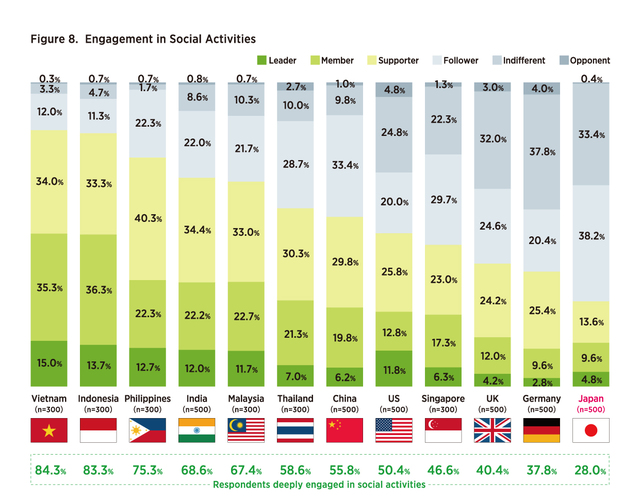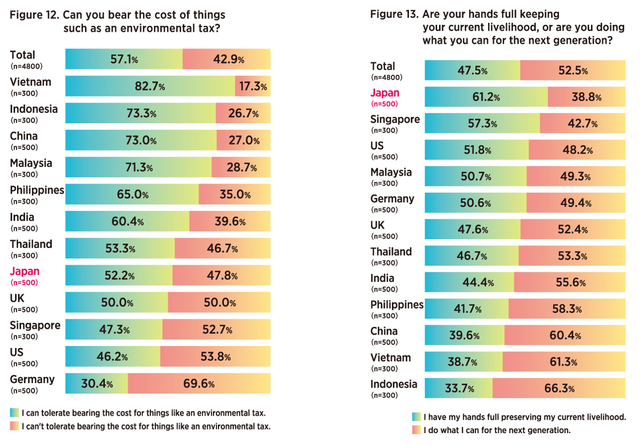"Own Interests and Benefits" stressed in Japan, the US, and Europe; "Public Welfare" emphasized in ASEAN Region and China
Dentsu Inc. (Headquarters: Minato-ku, Tokyo; President & CEO: Hiroshi Igarashi; hereinafter, "Dentsu" or the "Company") announced today that the Global Business Center--its enterprise specializing in promotion of overseas business--and the Dentsu Institute (Location: Minato-ku, Tokyo; Executive Producer: Naoki Tani)--a Dentsu Group Inc. in-house organization--jointly ran the Sustainable Lifestyle Receptivity Survey 2021. The poll was conducted in July 2021 in 12 countries (Japan, Germany, the United Kingdom, the United States, China, India, Indonesia, Malaysia, the Philippines, Singapore, Thailand, and Vietnam).
The survey was conducted to compare both the differences in receptivity to sustainability-related efforts (such as the reduction of CO2 emissions and the elimination of plastic waste), as well as changes since the 2010 survey.1 The main findings are as follows.
1. Japan Compared with 12 Nations Polled
The survey was conducted to compare both the differences in receptivity to sustainability-related efforts (such as the reduction of CO2 emissions and the elimination of plastic waste), as well as changes since the 2010 survey.1 The main findings are as follows.
1. Japan Compared with 12 Nations Polled
(1) Social Issues of Interest
Only Japan ranks high on "Falling birthrate and aging population."
Ranking in Japan: 1. Natural disasters (57.2%); 2. Falling birthrate and aging population (45.6%); 3. Air pollution (41.6%)
(2) Recycling Behavior
(2) Recycling Behavior
"Using Eco bags" (78.8%) and "Buying refillable products" (67.8%) ranked higher in Japan than average.
(3) Support for Social Activities
(3) Support for Social Activities
Respondents deeply engaged in "Social activities such as the collection of signatures and donations" ranked lowest (28.0%) in the 12 countries polled.
(4) Triggers for Interest in Social Issues
(4) Triggers for Interest in Social Issues
In Japan, "News and [print/internet] articles" (56.0%); in ASEAN, "Social media posts" ranked high.
(5) Sustainability Image
(5) Sustainability Image
In Japan, the United States, and Europe, "Global environment" (51.8%) and "Recycling society/circular economy" (29.2%) ranked high.
(6) The Year 2030 Image
(6) The Year 2030 Image
Only in Japan did "Anxiety" (34.6%) rank high.
(7) Economic Awareness
(7) Economic Awareness
"I have my hands full keeping my current livelihood" (61.2%) ranked top in the 12 countries surveyed.
2. Changes in Japan between the 2010 and 2021 Surveys
(1) Sustainability Image
2. Changes in Japan between the 2010 and 2021 Surveys
(1) Sustainability Image
Top-ranked "Global environment" was unchanged. Items in second place and lower changed from vague images to concrete facts.
(2) The Year 2030 Image
(2) The Year 2030 Image
Top-ranked "Anxiety" and "Digital" were unchanged. "Biotechnology/genomics" and "Diversity" ranked high.
(3) Consumption Awareness
(3) Consumption Awareness
In Japan, consumption is for "Own interests and benefits" (61.6%), rather than for "Public welfare."
Survey Results Analysis
In Japan, the image of sustainability is more concrete now than it was 10 years ago, with reusable bags and refillable products having become commonplace. However, despite a certain degree of environmental awareness when shopping, only some people are willing to accept the burden of environment-related costs and support related social activities. Thus, it cannot be said that the average Japanese is fully aware of the ramifications of utilization and disposal. Further, more people have their hands full keeping their livelihood than worrying about the welfare of the next generation. This is a trend seen in other economically advanced countries.2 Differing from Japan are the ASEAN members Indonesia, the Philippines, and Vietnam. The survey results show a high percentage of the people in these nations support social activities, are willing to prioritize consumption-related public welfare, and engage in recycling. Further, interest in social issues is triggered by "Social media postings." This indicates a difference in terms of media contact, compared with the predominance of news in economically advanced countries. Since the ASEAN region has a youthful population, the explosion of social media use has the potential to widely disseminate environmental sustainability awareness.
1. Japan Compared with 12 Nations Polled
Survey Results Analysis
In Japan, the image of sustainability is more concrete now than it was 10 years ago, with reusable bags and refillable products having become commonplace. However, despite a certain degree of environmental awareness when shopping, only some people are willing to accept the burden of environment-related costs and support related social activities. Thus, it cannot be said that the average Japanese is fully aware of the ramifications of utilization and disposal. Further, more people have their hands full keeping their livelihood than worrying about the welfare of the next generation. This is a trend seen in other economically advanced countries.2 Differing from Japan are the ASEAN members Indonesia, the Philippines, and Vietnam. The survey results show a high percentage of the people in these nations support social activities, are willing to prioritize consumption-related public welfare, and engage in recycling. Further, interest in social issues is triggered by "Social media postings." This indicates a difference in terms of media contact, compared with the predominance of news in economically advanced countries. Since the ASEAN region has a youthful population, the explosion of social media use has the potential to widely disseminate environmental sustainability awareness.
1. Japan Compared with 12 Nations Polled
(1) Social Issues of Interest
Only Japan ranks high for "Falling birthrate and aging population."
Ranking in Japan: 1. Natural disasters (57.2%); 2. Falling birthrate and aging population (45.6%); 3. Air pollution (41.6%)
・In the United Kingdom, Germany, and Singapore, "Ocean plastic waste," in the United States "Racism" and "Healthcare system and facilities," in China, India, and Vietnam "Air pollution" and "Water pollution and shortages," in the Philippines, Malaysia, Indonesia, and India "Public health," and in Thailand "Unemployment rate" ranked high, indicating large regional differences in social issues of interest.
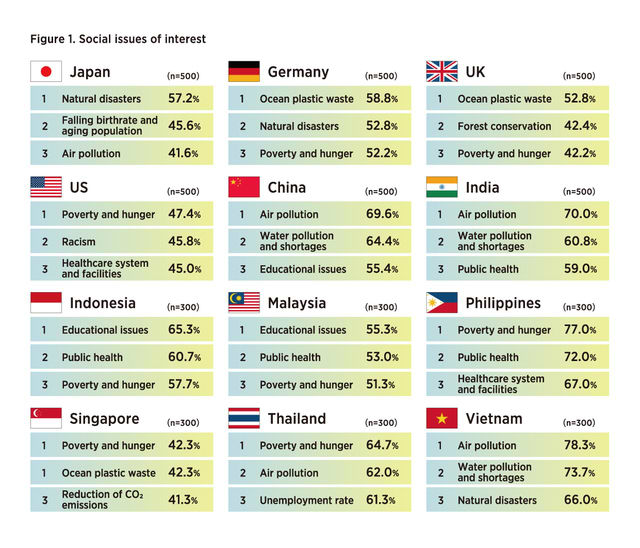 (2) Recycling Behavior
(2) Recycling Behavior
 (2) Recycling Behavior
(2) Recycling Behavior "Using Eco bags" (78.8%), "Buying refillable products" (67.8%), ranked higher than average.
・Japan ranks second in "Using Eco bags" after the Philippines, and third in "Buying refillable products" after the Philippines and Indonesia.
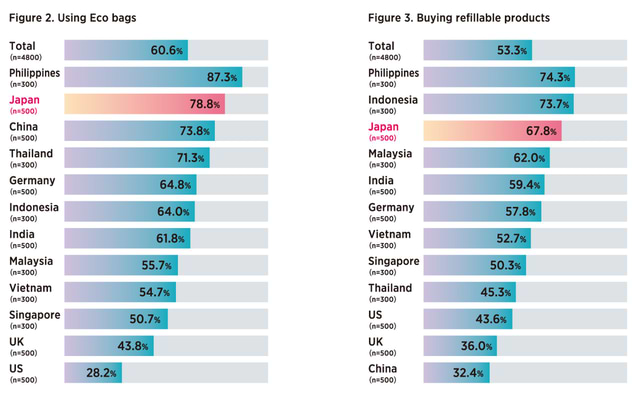 ・In Japan, there is little awareness of environment-related possibilities when eating and drinking outside the home, such as taking along bottles of water and taking home leftover food from restaurants.
・In Japan, there is little awareness of environment-related possibilities when eating and drinking outside the home, such as taking along bottles of water and taking home leftover food from restaurants.
 ・In Japan, there is little awareness of environment-related possibilities when eating and drinking outside the home, such as taking along bottles of water and taking home leftover food from restaurants.
・In Japan, there is little awareness of environment-related possibilities when eating and drinking outside the home, such as taking along bottles of water and taking home leftover food from restaurants.・Taking along bottles of water is more common in most countries than it is in Japan.
・In China, the Philippines and the United States, 60-70% of respondents said they take home leftover food from restaurants.
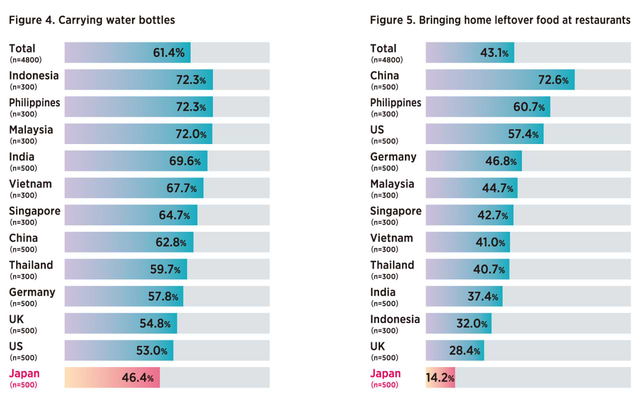 ・Compared with other countries, the percentage of respondents in Japan who recycle or donate unused items is low.
・Compared with other countries, the percentage of respondents in Japan who recycle or donate unused items is low.
 ・Compared with other countries, the percentage of respondents in Japan who recycle or donate unused items is low.
・Compared with other countries, the percentage of respondents in Japan who recycle or donate unused items is low.・The percentage of respondents who "Take unused clothing and toys to store collection boxes" is highest in Indonesia and Vietnam; the United Kingdom ranks top for "Donating unneeded goods or books or dropping them off at second-hand stores"; and Vietnam ranks high in both categories.
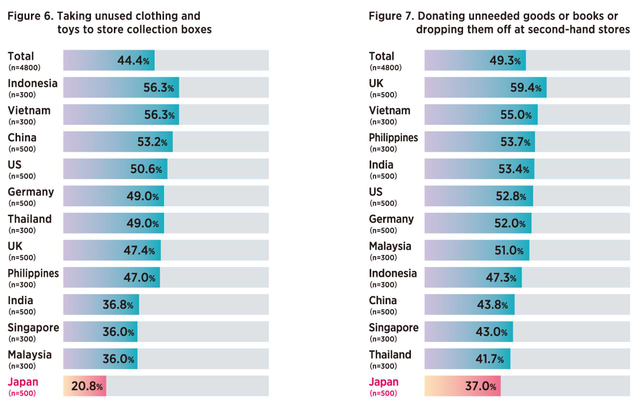 (3) Support for Social Activities
(3) Support for Social Activities
 (3) Support for Social Activities
(3) Support for Social ActivitiesRespondents deeply engaged in "Social activities such as the collection of signatures and donations" ranked lowest across the 12 countries at 28.0%.
・In Indonesia, the Philippines and Vietnam, approximately 80% of respondents are deeply engaged in social activities3 (total number of respondents indicating they are an event planning leader, event participant, or information-sharing event supporter), and it seems that in these countries it is easier to visualize social activities than in the United Kingdom, Germany, and Japan, where less than half of the respondents indicate that they are deeply engaged in such efforts.
・In Indonesia, the Philippines and Vietnam, approximately 80% of respondents are deeply engaged in social activities3 (total number of respondents indicating they are an event planning leader, event participant, or information-sharing event supporter), and it seems that in these countries it is easier to visualize social activities than in the United Kingdom, Germany, and Japan, where less than half of the respondents indicate that they are deeply engaged in such efforts.
In Japan "News and [print/internet] articles" (56.0%) and in ASEAN "Social media posts" ranked high.
・In Japan as in the United Kingdom, China, and Germany, "News and [print/internet] articles" surpassed "Social media posts."
・In Japan as in the United Kingdom, China, and Germany, "News and [print/internet] articles" surpassed "Social media posts."
・In the ASEAN region, "Social media posts" surpassed "News and [print/internet] articles," confirming that, as indicated in (3) above, there is a relationship with strong interest in social activities.
・Among free-response questions pertaining to information sources, in Japan the news (obtained via television programs, websites, and apps) ranked top, with Twitter high in terms of social media.
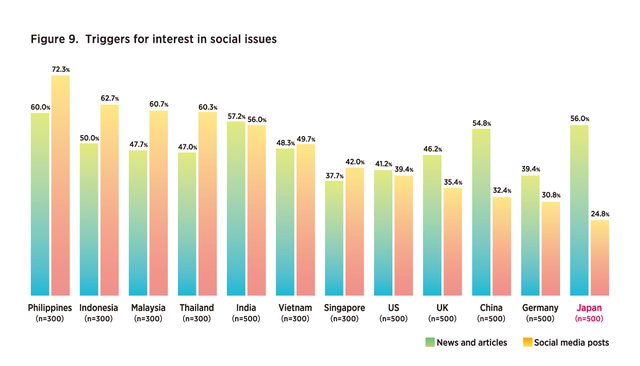 (5) Sustainability Image
(5) Sustainability Image
 (5) Sustainability Image
(5) Sustainability Image As in the United States and Europe, "Global environment" (51.8%) and "Recycling society/circular economy" (29.2%) ranked high.
・In the United Kingdom and Germany "Responsibility/obligation" ranked highest.
・In ASEAN nations and China, "Development," "Technological advancement" and other forms of technological and industrial growth are also associated with "Sustainability."
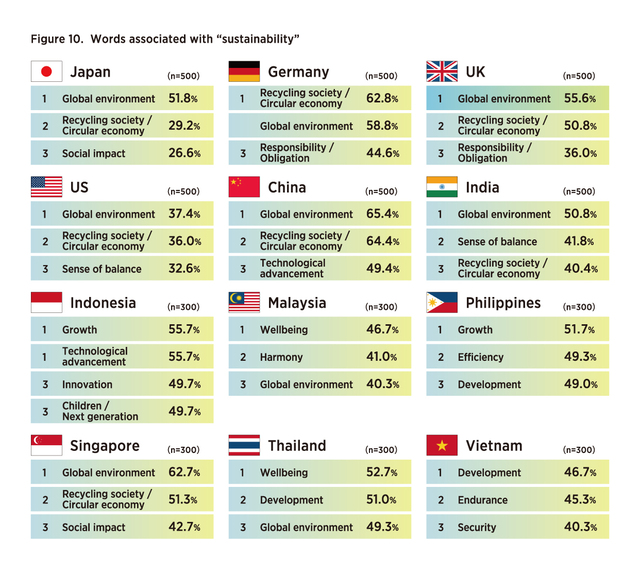 (6) The Year 2030 Image
(6) The Year 2030 Image
 (6) The Year 2030 Image
(6) The Year 2030 Image Only in Japan did "Anxiety" (34.6%) rank high.
・"Digital," "Technological advancement," "Development," and "Global" ranked high in all countries.
・Rather than in question (5) on Sustainability Image, respondents associate more strongly with the image of technological and industrial growth.
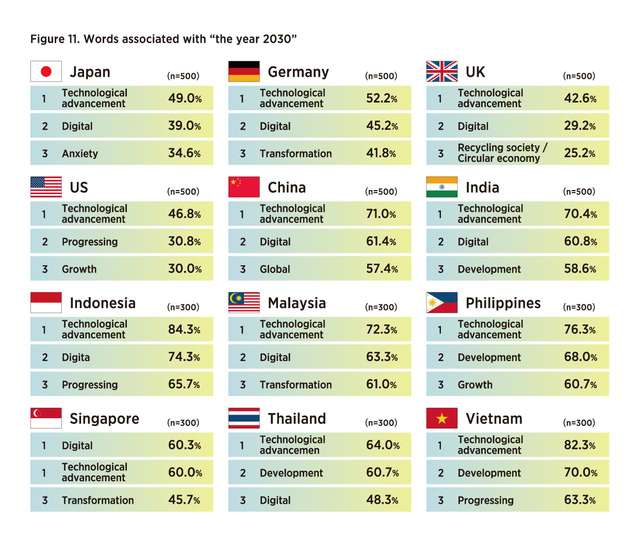 (7) Economic Awareness
(7) Economic Awareness
 (7) Economic Awareness
(7) Economic Awareness "I have my hands full keeping my current livelihood" (61.2%) ranked highest across the 12 countries.
・In Japan, the majority of respondents indicated "I can bear the cost of things such as an environmental tax;" but rather than focusing on what would benefit the next generation, Japan has the highest rate of responses indicating "I have my hands full keeping my current livelihood," a trend seen in Singapore and the United States.
・In Vietnam, India, and China, 70-80% of respondents indicate "I can bear the cost of things such as an environmental tax" and, rather than indicating "I have my hands full keeping my current livelihood," a large percentage indicate "I do what I can for the next generation."
・In Vietnam, India, and China, 70-80% of respondents indicate "I can bear the cost of things such as an environmental tax" and, rather than indicating "I have my hands full keeping my current livelihood," a large percentage indicate "I do what I can for the next generation."
(1) Sustainability Image
"Global environment" remains in top place, while items ranked in second place and lower have changed from vague images to concrete facts.
・Ten years ago, vague terms such as "Connection/relationships," "Responsibility/obligation," "Children/next generation," and "Endurance" ranked high. In the 2021 survey, these items became more concrete and realistic in recognizing ongoing social issues. The changes include "Recycling society/circular economy," "Social impact," and "Diversity."
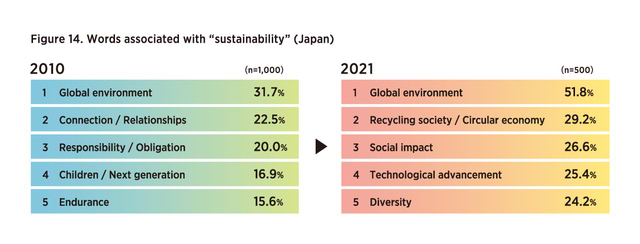 (2) The Year 2030 Image
(2) The Year 2030 Image
 (2) The Year 2030 Image
(2) The Year 2030 Image "Anxiety" and "Digital" remain in top place; "Biotechnology/genomics" and "Diversity" rank high.
・Ten years ago, words with vaguely negative images such as "Collapse" and "Far" ranked high, but in the 2021 survey, "Diversity" and "Biotechnology/genomics" ranked high, indicating a change to a more concrete recognition of the present situation and continuity into the future.
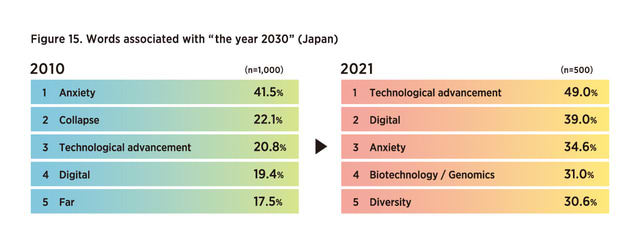 (3) Consumption Awareness
(3) Consumption Awareness
 (3) Consumption Awareness
(3) Consumption Awareness In Japan, consumption is for one's "Own interests and benefits" (61.6%) rather than for "Public welfare."
・In Japan, the percentage of respondents indicating consumption is for their "Own interests and benefits" increased, while consumption for "Public welfare" declined.
・In economically advanced countries such as Germany, the United Kingdom, the United States,4 Japan, and Singapore, approximately 60% of respondents indicate consumption is for their "Own interests and benefits."
・In Asian countries other than Japan and Singapore, the majority of respondents take into consideration "Public welfare," with the percentage being higher than in the previous survey.
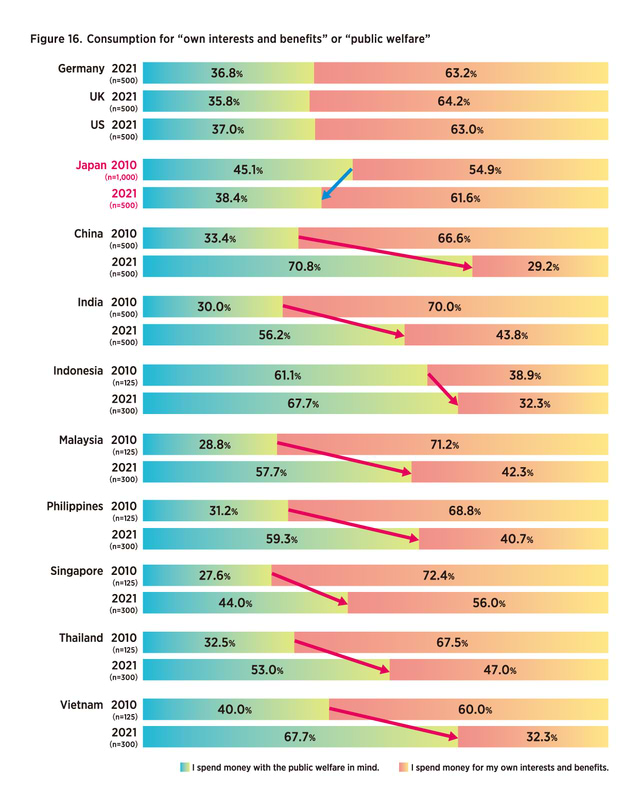
Survey Overview

Survey Overview
Title:Sustainable Lifestyle Receptivity Survey 2021
Survey method:Internet questionnaire
Conducted by:Dentsu Inc. and Dentsu Institute
Survey period:July 8-20, 2021
Countries targeted: 12 countries (Japan, Germany, United Kingdom, United States, China, India,
Indonesia, Malaysia, the Philippines, Singapore, Thailand, and Vietnam)
Indonesia, Malaysia, the Philippines, Singapore, Thailand, and Vietnam)
Sample size:4,800 respondents
Target conditions:500 men and women aged 18-69; Japan, Germany, United Kingdom,
United States, China, and India
United States, China, and India
300 men and women aged 18-44; Indonesia, Malaysia, the Philippines,
Singapore, Thailand, and Vietnam
Singapore, Thailand, and Vietnam
Notes:
1. Sustainable Lifestyle Receptivity Survey 2010, conducted March-November 2010
2. The definition of "economically advanced countries" in this survey is based on the "economically advanced countries" announced by the International Monetary Fund (IMF) in 2017, and corresponds to Japan, Germany, the United Kingdom, the United States, and Singapore.
3. In the question asking respondents to select the answer that best suits their level of participation in social activities, there were six options from which to choose: I am a leader planning social activities such as events and drives for donations, or for the collection of signatures; I am a member participating in social activities such as events and drives for donations, or for the collection of signatures; I am a supporter spreading information on social activities to those around me; I proactively seek information on social activities; I am not interested in information on social activities; I am opposed to such social activities. The comment "Social activities here indicate any activity that mobilizes people to address climate change or social inequalities" was also included in the question.
4. Germany, the United Kingdom, and the United States were not included in the 2010 survey. Regarding the other countries included in the survey, although sample size differed by survey year, the gender and age ratio can be compared in the 2010 and 2021 surveys.
Contact
Media-related inquiries: Corporate Communications Division

